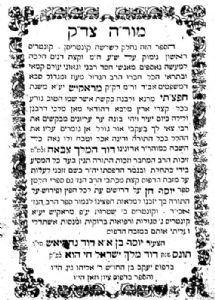A Short Tribute
Hacham David Sabbah, whose mother’s name was Mira, was born in Marrakesh, Morocco. He studied with the sages of his city, Hacham Shlomo Assebag and Hacham Moussa Ben David Ohayon.
In 1833, following the death of Hacham Abraham Pinto, he was appointed Chief Rabbi of Marrakesh and its surroundings.
Hacham David Sabbah passed away on the eve of Yom Kippur, 10 Tishrei 5618 (1858).
He authored many works, but most have been lost. Among those books that have been published are: Maskil LeDavid – original commentary on Bible and the Talmud, sermons and more; Moreh Tzedek – collections of articles; and SHU”T VeHidushei Rabbi David Sabbah u’Beit Dino - Responsa and innovations by Rabbi David Sabbah and his Rabbinic Court.
A few quotes from the Rabbi on 'Torah Study' in which he interprets “A Woman of Valor” in terms of the obligation to wear tzitzit [ritual fringed garment] which she undertakes of her own desire and will
“She seeks wool and flax, and works willingly with her hands”. This means to say that this woman, a woman of valor, is stringent in the demands she makes on herself by wearing tzitzit. She bases herself on a reasoning linked to (the Torah prohibition of) wearing sha’atnez (garments made of both wool and linen)… She seeks the reason for the adjacency of 'wool and flax', implying the wearing of sha’atnez, from which she concludes that she is obligated to wearing tzitzit, as follows from the issue raised by the Tosephot commentary. That is what is referred to by “wool and flax, and works…” - that specific item which is permitted to make out of wool and flax - tzitzit as they, of blessed memory, wrote. “…and works” – she fashioned and wore tzitzit; “…willingly with her hands” – in that she is not obligated by our Sages, of blessed memory, but does so of her own will and desire.
Maskil Ledavid – Original Commentary, p. 210, Pi Yesharim Institute, Jerusalem 2006
